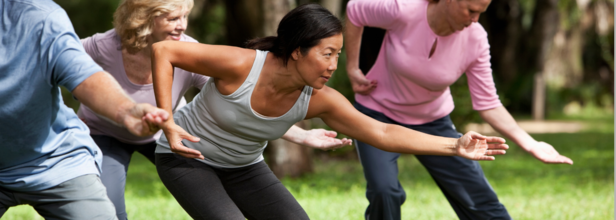
Image Credit: Canva
Why Tai Chi Is More Effective Than Regular Aerobics For Lowering Blood Pressure
Tai chi stands for hard but not harsh, soft but not yielding. All the Tai chi movements are fluid and extremely Zero intensity, rather No intensity. Tai chi is like weaving silk, weaving a fabric with circular movements and moving with the air and directions.
Tai chi is like Yoga unison with cosmic energy, and has a calming and soothing effect on your autonomic nervous system. It relaxes your blood pressure, thus relaxing your heart. It improves deep slow rhythmic breathing too. Your heart, and all systems organs and functions become slow and rhythmic, getting you synchronized with your circadian rhythm.
Even while aerobic activity is good for the heart, people with hypertension may not want to engage in it because it might cause brief rise in blood pressure.
Good hormones can be momentarily elevated by intense aerobic activity, which can raise blood pressure both during and right after exercise. This can be dangerous for some people, particularly those who have high blood pressure or are not used to exercising.
While regular exercises are good for cardiovascular health and general fitness, they usually don't include this contemplative or focused element, which is why Tai Chi can be especially good for regulating blood pressure, especially for people who are stressed or anxious.
Lowering blood pressure is better with Tai Chi than regular aerobics for several reasons, they are:
1) Relaxation and slow movement
By promoting mental calmness, the practice lowers the stress reaction, which is essential for lowering blood pressure. Tai Chi counteracts the effects of stress and anxiety by producing a relaxation response and activating the parasympathetic nervous system through the integration of conscious breathing with the motions.
2) Improved Blood Flow
The gentle, flowing movements of tai chi contribute to better blood flow and circulation without being taxing. Over time, the controlled posture and slow motions can help lower blood pressure by increasing vascular flexibility.
3) Stress Hormones reduced
Tai Chi's deep breathing and awareness trigger the relaxation response, which lowers cortisol and adrenaline levels, two stress hormones. A long-term drop in blood pressure is facilitated by this decrease in stress chemicals.
4) Better for Elderly People or People with Health Concerns
Because tai chi is frequently seen as a low-impact workout, anyone with joint problems, balance disorders, or those who are elderly or fragile can participate. For people with high blood pressure who might not be able to handle the strain or effects of more intense cardio exercises, this makes it a safer option.
5) Mind-Body Connection
Tai Chi places a strong emphasis on the relationship between the mind and body, urging practitioners to pay attention to posture, breathing, and mental clarity as these factors have a direct impact on blood pressure regulation and general well-being. Tai Chi's meditative qualities aid in fostering inner peace and lowering emotional tension, two things that are crucial for controlling hypertension.
Tai- chi, de-stresses your mind, empties your negative emotions. So, pain, insecurity, hurt, resentments, and grudges get dissolved. Brings in The ultimate peace.
© 2024 Bennett, Coleman & Company Limited

